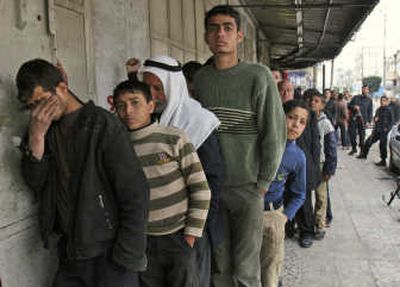Israel to ease blockade, send Gaza fuel and food

GAZA CITY – Israel agreed to allow limited supplies of fuel, medicine and food into the Gaza Strip today, easing a blockade that left large parts of the Palestinian territory without electricity and drew international protests.
The promise of relief also followed a sharp decline in the rocket attacks from Gaza that had prompted Israel to halt the shipments Thursday.
Residents of Gaza City spent a second night in cold, darkened homes after the coastal enclave’s only power plant shut down Sunday. The city’s main hospital, down to its last two days of generator fuel, delayed nearly half the surgeries scheduled for Monday. Bakeries and gasoline stations closed.
The shipments authorized Monday by Defense Minister Ehud Barak include enough diesel fuel to run the power plant for a week and the hospital generators for three days, as well as a supply of cooking gas and 50 truckloads of food and medicine.
Israeli officials said future shipments would depend on assessments of Gaza’s humanitarian needs and on the number of rockets fired from Gaza. The territory is governed by the radical Islamic group Hamas, which advocates Israel’s destruction.
“We hope Hamas has got the message,” Israeli Foreign Ministry spokesman Arye Mekel said. “When they want to reduce the number of rockets they can do it.”
Israeli police said three homemade Kassam rockets and five mortar shells fell harmlessly in Israel’s western Negev region Monday, a significant drop from the 53 that had struck the two previous days.
Hamas political leaders offered no explanation for the decline. A Hamas spokesman, Sami Abu Zuhri, said foreign pressure had prompted Israel to ease the blockade, “but this does not mean the end of the siege on Gaza.”
Protests against the blockade came from the European Union, the United Nations, the Oxfam relief agency, the Arab League and Egyptian President Hosni Mubarak. They criticized what they called Israel’s “collective punishment” of Gaza’s 1.5 million people.
Israel’s highest officials defended the blockade.
Barak said Israel “must apply more and more pressure on Gaza” to enable Israeli border communities to “live in quiet.”
“If this ‘quiet’ requires the other side to live in ‘noise,’ then there will be noise,” Barak told a forum at a security conference in Israel. “I know this is difficult. However, I care more about our quiet than about theirs.”
Israeli Prime Minister Ehud Olmert said he would not push Gazans into a humanitarian crisis but warned that they won’t be allowed to live a “pleasant and comfortable life” as long as the rockets keep coming.
“As far as I’m concerned,” he told a group of legislators, “Gaza residents will walk, without gas for their cars, because they have a murderous, terrorist regime that doesn’t let people in southern Israel live in peace.”